Hundreds gather for Yellowknife demonstration in solidarity with Black Lives Matter
Hundreds of people gathered in Yellowknife, the capital of the Northwest Territories, on Tuesday for an anti-racism march and demonstration in solidarity with Black Lives Matter.
People congregated outside the Multiplex Arena a little before 2 p.m. Initially, the plan was for protesters to leave in a motorcade with signs on their vehicles and drive downtown toward City Hall, and back. According to the Facebook event, they were then meant to disperse and view speeches online, in keeping with directions from the chief public health officer.
But things didn't go according to that plan.
After hundreds gathered for a prayer and short speeches, organizer Ambe Chenemu told the crowd there was "surprise" and protesters would be marching downtown toward City Hall and the next-door RCMP station where there would be speeches, disregarding the chief public health officer's directions.
"If they have an issue with that, we'll have that conversation," said Chenemu.
There were chants of "no justice, no peace" and vehicles honked their horns in support as people marched down Franklin Ave., Yellowknife's main thoroughfare, toward the RCMP detachment. Some vehicles followed.
Tuesday's march took place on the same day as the funeral in Houston for George Floyd, a man who was murdered in Minneapolis, Minn., by a police officer who kneeled on his neck for nearly nine minutes. Floyd's killing, which was caught on video, sparked worldwide protests against anti-Black racism.
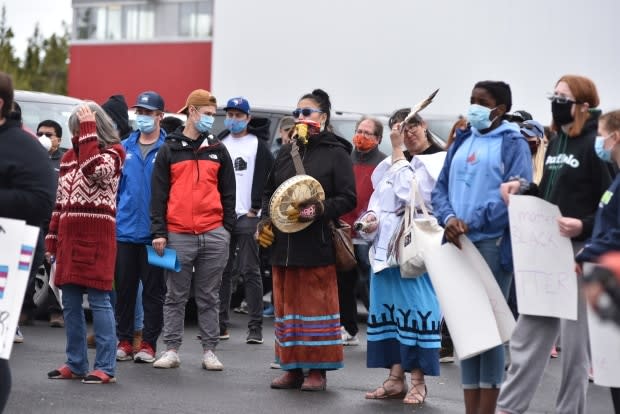
"I feel like a lot of Black people watched that video and they were upset, but they weren't shocked, because this happens all the time," said Inemesit Graham, who helped organize the event's speakers.
Graham said she was originally asked to organize the march itself, but felt it shouldn't be her responsibility to do so. Instead, the event was organized by multiple community members and activists and promoted by the Public Service Alliance of Canada, the union representing federal government workers.
"The reason I didn't want to organize it was because racism isn't new," Graham said. "If you speak to any person of colour, any Indigenous person, I guarantee they have experienced it in their life."

Graham said she felt like it should be organized by advocates instead.
Rallies took place across Canada on Friday and over the weekend, including the community of Fort Smith, N.W.T., where around 60 people gathered on Saturday.
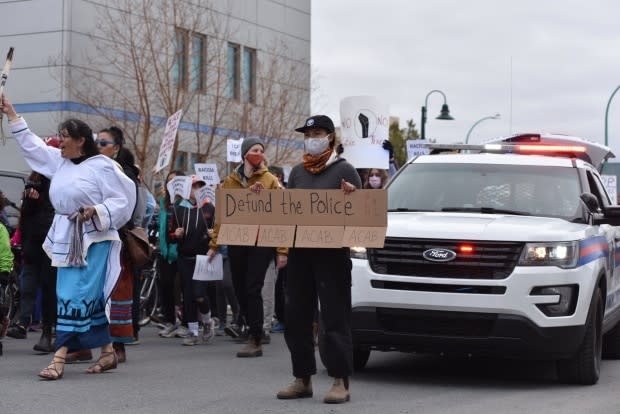
"I know my life matters, but I want you to believe it with the same conviction and to protest with the same conviction that I have been protesting and my people have been protesting for 400 years," said Graham.
"Change will only happen if the majority of people say it … that's the power of advocacy."
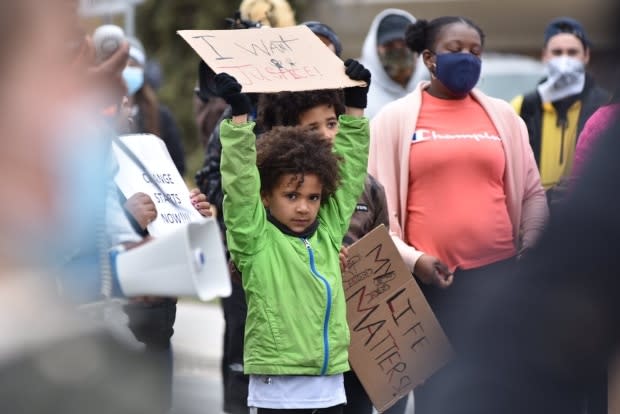
Rallies across the country have cited police violence in Canada, with many protesting and mourning the recent death of Regis Korchinski-Paquet, a Black woman who died during an encounter with Toronto police.
In front of the RCMP station Tuesday, Chemenu, microphone in hand, led a chant of "enough is enough," and called on RCMP to adopt body cameras and to make the footage publicly available.
Chemenu decried racism against Black and Indigenous people in Canada.
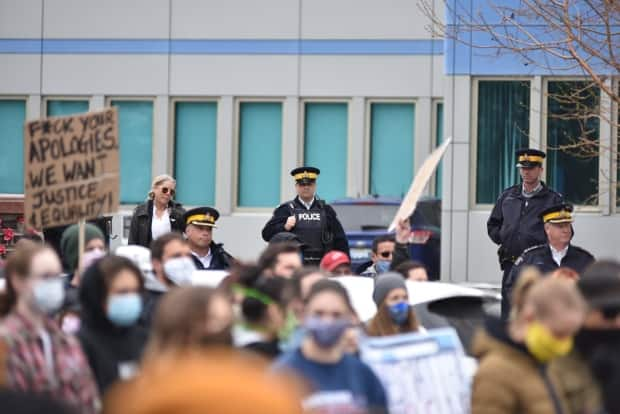
Amid chants of "defund the police," a number of RCMP officers observed the demonstration outside their headquarters, including N.W.T. RCMP Chief Superintendent Jamie Zettler.
"There's no place for racism, not only in the RCMP, but in our society," Zettler told CBC, adding that, "certainly, without a doubt, there's times and opportunities where I believe that people don't feel like they've been treated properly."
"We've heard many people say that there is racism in policing, there's racism in the RCMP," he said. "I'm a little bit biased on this aspect. I'm a white male. It's tough for me to sit there and understand how people feel and whatnot.
"Again, we do everything we can to ensure that we treat people fairly. Does that happen every day? I doubt it because we're all human beings."
At one point, Chemenu instructed demonstrators to take a knee, and some of the officers did so, as well.

There were also speeches from leaders in the city, including Ndilo Chief Ernest Betsina, who paid tribute to George Floyd. "Let us continue to fight for equality and justice," he said.
In her speech, Yellowknife city councillor Cynthia Mufandaedza said, "We cannot continue to say we do not see colour. We would like you to see colour and celebrate colour."
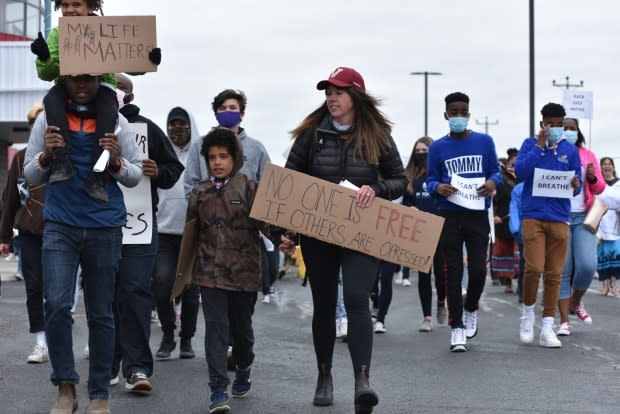
The protests were peaceful with those gathered remaining quiet while speakers made their remarks, except for when being led in chants.
While the mass of people did not maintain two metres distance from one another, nearly everyone was wearing a face mask.
"While I understand it, we're in the middle of a pandemic, so is the rest of the world [and] everybody else is marching," said Graham.
"Yes, we're in the middle of a pandemic, but a lot of people view racism as a pandemic. Racism is a real pandemic. And people are upset."


